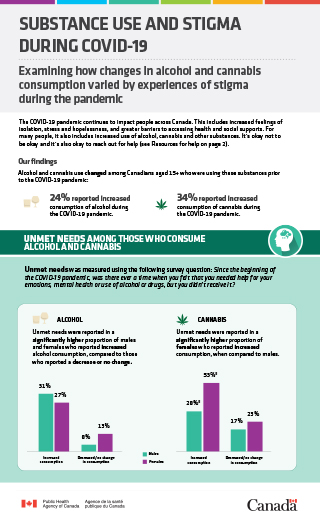Infographic: Examining how changes in alcohol and cannabis consumption varied by experiences of stigma during the COVID-19 pandemic in Canada
Download in PDF format
(137.5KB, 2 pages)
Organization: Public Health Agency of Canada
Date published: 2022-10-25
The COVID-19 pandemic continues to impact people across Canada. This includes increased feelings of isolation, stress and hopelessness, and greater barriers to accessing health and social supports. For many people, it also includes increased use of alcohol, cannabis and other substances. It’s okay not to be okay and it’s also okay to reach out for help.
Our findings
Alcohol and cannabis use changed among Canadians aged 15+ who were using these substances prior to the COVID-19 pandemic:
- 24% reported increased consumption of alcohol during the COVID-19 pandemic
- 34% reported increased consumption of cannabis during the COVID-19 pandemic
Unmet needs among those who consume alcohol and cannabis
Unmet needs was measured using the following survey question: “Since the beginning of the COVID-19 pandemic, was there ever a time when you felt that you needed help for your emotions, mental health or use of alcohol or drugs, but you didn’t receive it?”
Alcohol
Unmet needs were reported in a significantly higher proportion of males and females who reported increased alcohol consumption, compared to those who reported a decrease or no change.
| Average change in alcohol consumption during COVID-19 | Prevalence of males with unmet needs | Prevalence of females with unmet needs |
|---|---|---|
| Increased | 31% | 27% |
| Decreased or no change | 8% | 13% |
Cannabis
Unmet needs were reported in a significantly higher proportion of females who reported increased consumption, when compared to males.
| Average change in cannabis consumption during COVID-19 | Prevalence of males with unmet needs | Prevalence of females with unmet needs |
|---|---|---|
| Increased | 28% Table 2 Footnote E | 53% Table 2 Footnote E |
| Decreased or no change | 17% | 23% |
|
||
Self-stigma among those who consume alcohol and cannabis
What is self-stigma?
Self-stigma refers to the process when an individual internalizes negative societal attitudes and messages about their situation in life (e.g., substance use) and applies them to themselves. It may lead to low self-esteem and isolation. It can act as a barrier to seeking support, recovery and overall wellbeing.
Self-stigma was more prevalent among those who reported increased consumption of alcohol and cannabis during the COVID-19 pandemic, compared to those who reported a decrease or no change.
Self-stigma was assessed based on strong or general agreement to the following two statements:
- “I find it embarrassing/uncomfortable to seek help/treatment for my alcohol/drug use”
- “I find it embarrassing/uncomfortable to tell friends/family about my alcohol/drug use”
| Average change in alcohol consumption during COVID-19 | Prevalence of individuals experiencing self-stigma |
|---|---|
| Increased | 36% |
| Decreased | 15% |
| Average change in cannabis consumption during COVID-19 | Prevalence of individuals experiencing self-stigma |
|---|---|
| Increased | 42% |
| Decreased or no change | 19% |
Resources for help
You can support your friends and family members by letting them know they are not alone and that supports are available. If you are concerned about your substance use, reaching out for help is the first step towards wellness. Supports are available, including:
- The Wellness Together Canada online portal offers immediate, free and confidential substance use and mental health supports, in English and French, 24 hours a day, seven days a week to all Canadians
- The Hope for Wellness Help Line offers immediate and culturally competent mental health counselling and crisis intervention to all Indigenous peoples across Canada, 24 hours a day, seven days a week. Counselling is available in Cree, Ojibway and Inuktitut
- Kids Help Phone
- Get Help With Substance Use
- Mental health support: Get help
- COVID-19 Resources for parents and children
Notes
The analyses for this infographic were conducted using publicly available data from Statistics Canada’s “Canadian Perspectives Survey Series 6: Substance Use and Stigma during the Pandemic.” This survey was administered from January 25th-31st, 2021 to individuals aged 15 years and older in the ten Canadian provinces.
Proportions in figures do not add up to 100% as estimates for respondents who did not report experiencing unmet needs/self-stigma are not shown in the figures.
References
- Corrigan PW, Rao D. On the self-stigma of mental illness: stages, disclosure, and strategies for change. Can J Psychiatry. 2012 Aug;57(8):464-9. doi: 10.1177/070674371205700804.
- Government of Canada [Internet]. Stigma around drug use; 2021 [cited 2022 Jan 24]. Available from: https://www.canada.ca/en/health-canada/services/opioids/stigma.html#a4
